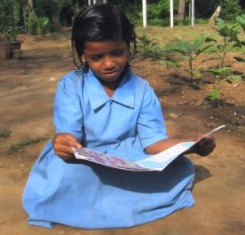Professional Organizations
The following organizations, listed in alphabetical order, are related to the topic of intrinsic motivation and learning disabilities through their support of research, education, and the dissemination of information on the subject of learning disabilities.
Council for Exceptional Children (CEC), Division for Learning Disabilities (DLD)
The Council for Exceptional Children (CEC) is “the largest international professional organization dedicated to improving educational outcomes for individuals with exceptionalities, students with disabilities, and/or the gifted” (John Wiley and Sons, Inc., 2009). A non-profit organization with national and local chapters, the CEC is made up of 17 specialized divisions, which provide more specific information and services to individuals with particular exceptionalities. The Division for Learning Disabilities (DLD) provides information, hosts conferences, and “works to improve services, research and legislation for individuals with learning disabilities” (Council for Exceptional Children, 2007). The DLD also publishes the journal Learning Disabilities Research & Practice, which has addressed the issue of intrinsic motivation in students with LD, and also provides practical applications of current research.
The Council for Exceptional Children (CEC) is “the largest international professional organization dedicated to improving educational outcomes for individuals with exceptionalities, students with disabilities, and/or the gifted” (John Wiley and Sons, Inc., 2009). A non-profit organization with national and local chapters, the CEC is made up of 17 specialized divisions, which provide more specific information and services to individuals with particular exceptionalities. The Division for Learning Disabilities (DLD) provides information, hosts conferences, and “works to improve services, research and legislation for individuals with learning disabilities” (Council for Exceptional Children, 2007). The DLD also publishes the journal Learning Disabilities Research & Practice, which has addressed the issue of intrinsic motivation in students with LD, and also provides practical applications of current research.
Council for Learning Disabilities (CLD)
The Council for Learning Disabilities (CLD) is an international organization with regional chapters in the United States. The CLD’s primary goal is to “build a better future for students with LD” through the promotion of effective teaching and research (Council for Learning Disabilities, n.d.). Founded over 30 years ago, and the CLD publishes the journals Learning Disability Quarterly and Intervention in School & Clinic, and the newsletter LD Forum, which educate researchers, educators, and the public about current issues in the field. Members of the CLD are professionals in various disciplines who are interested in issues related to learning disabilities. The CLD is also a founding member of both the National Joint Committee on Learning Disabilities and the Coordinated Campaign on Learning Disabilities.
The Council for Learning Disabilities (CLD) is an international organization with regional chapters in the United States. The CLD’s primary goal is to “build a better future for students with LD” through the promotion of effective teaching and research (Council for Learning Disabilities, n.d.). Founded over 30 years ago, and the CLD publishes the journals Learning Disability Quarterly and Intervention in School & Clinic, and the newsletter LD Forum, which educate researchers, educators, and the public about current issues in the field. Members of the CLD are professionals in various disciplines who are interested in issues related to learning disabilities. The CLD is also a founding member of both the National Joint Committee on Learning Disabilities and the Coordinated Campaign on Learning Disabilities.
International Academy for Research in Learning Disabilities
Founded in 1976 by Dr. William Cruickshank (from the US) and Dr. Jacob Valk (from the Netherlands), the International Academy for Research in Learning Disabilities (IARLD), an international, interdisciplinary professional organization, is “dedicated to conducting and sharing research about individuals who have learning disabilities” (International Academy for Research in Learning Disabilities, 2008). Since its first World Congress in 1980, the IARLD has hosted numerous meetings and conferences on learning disabilities throughout the world (including conferences in Canada, Greece, and Italy). Members include researchers, practitioners, clinicians and doctoral students interested in exchanging “information and the advancement of knowledge regarding learning disabilities” (International Academy for Research in Learning Disabilities, 2008). The international scope of this organization results in a cross-cultural exchange of ideas and research, and greater opportunities for advancement in the field.
Founded in 1976 by Dr. William Cruickshank (from the US) and Dr. Jacob Valk (from the Netherlands), the International Academy for Research in Learning Disabilities (IARLD), an international, interdisciplinary professional organization, is “dedicated to conducting and sharing research about individuals who have learning disabilities” (International Academy for Research in Learning Disabilities, 2008). Since its first World Congress in 1980, the IARLD has hosted numerous meetings and conferences on learning disabilities throughout the world (including conferences in Canada, Greece, and Italy). Members include researchers, practitioners, clinicians and doctoral students interested in exchanging “information and the advancement of knowledge regarding learning disabilities” (International Academy for Research in Learning Disabilities, 2008). The international scope of this organization results in a cross-cultural exchange of ideas and research, and greater opportunities for advancement in the field.
Learning Disabilities Association of Canada
Founded in 1963, the Learning Disabilities Association of Canada (LDAC) is a voluntary organization with chapters in each Canadian province and in two territories. Members of this non-profit association are mostly parents, although many doctors, psychologists, educators, and other professionals are also involved. The LDAC’s mission is “to be the national voice for personals with learning disabilities and those who support them,” and to promote a “level playing field” for people with learning disabilities, thus allowing them to “function as citizens with equitable opportunities and to develop their chosen potential” (Learning Disabilities Association of Canada, 2005). The LDAC tries to raise awareness by gathering and distributing information about learning disabilities. To accomplish this, the organization holds workshops; publishes manuals, guides, self-help books, and reference books, as well as a tri-annual newsletter; and hosts bi-annual national conferences in addition to provincial/territorial conferences (Learning Disabilities Association of Canada, 2005).
Founded in 1963, the Learning Disabilities Association of Canada (LDAC) is a voluntary organization with chapters in each Canadian province and in two territories. Members of this non-profit association are mostly parents, although many doctors, psychologists, educators, and other professionals are also involved. The LDAC’s mission is “to be the national voice for personals with learning disabilities and those who support them,” and to promote a “level playing field” for people with learning disabilities, thus allowing them to “function as citizens with equitable opportunities and to develop their chosen potential” (Learning Disabilities Association of Canada, 2005). The LDAC tries to raise awareness by gathering and distributing information about learning disabilities. To accomplish this, the organization holds workshops; publishes manuals, guides, self-help books, and reference books, as well as a tri-annual newsletter; and hosts bi-annual national conferences in addition to provincial/territorial conferences (Learning Disabilities Association of Canada, 2005).
© Rose Atkins 2009



